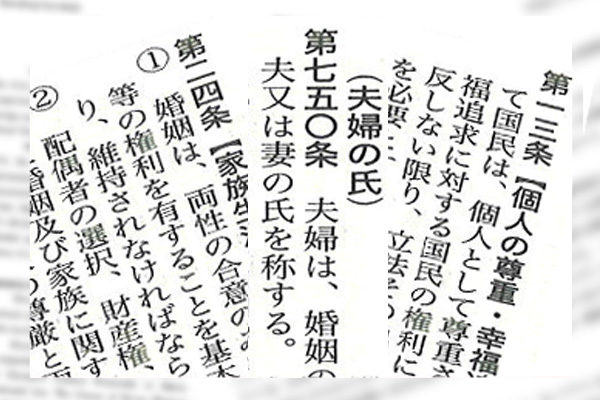In an announcement on September 6 to run in the ruling Liberal Democratic Party’s presidential election that effectively determines Japan’s next prime minister, Shinjiro Koizumi pledged to submit a bill to introduce a system of selective surnames for married couples. The system would allow a couple to choose the same surname or different surnames when they get married. Koizumi may want to take advantage of fresh campaign promises to emphasize his youthfulness. However, I doubt the advisability of proposing such grave institutional change without sufficient discussion.
The same surname is a symbol of family unity
In the 23rd “Speaking Out” column on February 1, 2010, I objected to the proposal by the then ruling Democratic Party of Japan to allow married couples to have separate surnames. I still remain opposed to arguments for separate surnames for married couples. This is because the same surname is a symbol of the unity of a family, including the husband, wife, and children. If the different surnames of the husband and wife are allowed, the surname of their child will be different from that of the father or mother, impairing the family unity. When there are multiple children, the question of what to do with the surname between siblings will arise.
Advocates of separate surnames argue that the current same-surname system effectively forces women inconveniently and discriminatingly to change their surnames when getting married because they do so in the overwhelming majority of marriage cases. In addition, opinion polls show that a majority of people support the selective surname system, advocates say.
However, opinion polls should not be used as a decisive reason for proposing the selective surname system, as many respondents might have been influenced by media propaganda in favor of the selective surname system and might have believed that the selective surname system would have no major adverse effects as it allows a couple to choose to have the same surname.
Legally allowing the use of birth names is an option
As for an argument that the same surname system is practically disadvantageous for women, the degree of disadvantageousness has been reduced due to the spread of a system that allows maiden names as popular names. If the inconvenience still remains, the system can be improved.
It is also conceivable to create a system that would require the husband and wife to have the same surname upon marriage but legally allows the husband or wife who changed his or her surname to use a birth name by reporting that he or she would prefer using the birth name upon or after marriage. This may be called a premarital surname succession system. Under this system, anyone would be legally allowed to continue to use both a surname that represents the family and a premarital surname that represents personal identity. This system would eliminate discrimination against or inconvenience for women.
While I believe that this system should be introduced in the future, Koizumi’s proposal is nothing more than a shallow attempt to introduce a system of separate surnames for married couples in one fell swoop without taking into account arguments such as the ones above.
Katsuhiko Takaike is an attorney-at-law and Vice President of the Japan Institute for National Fundamentals.


